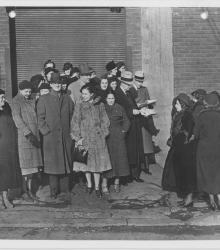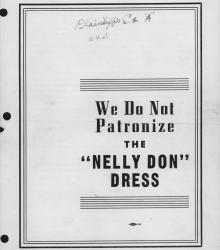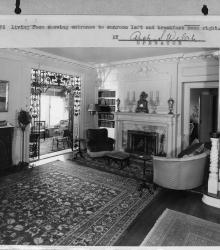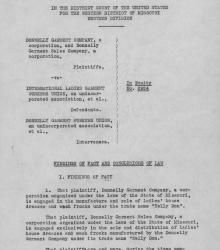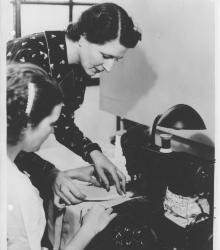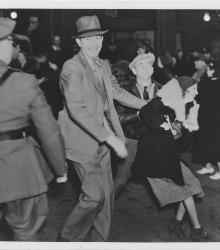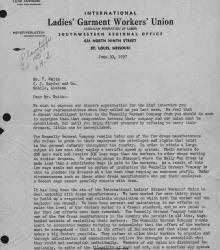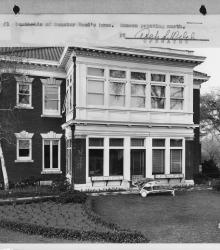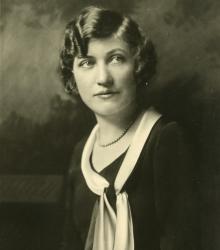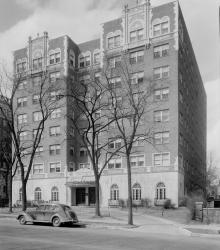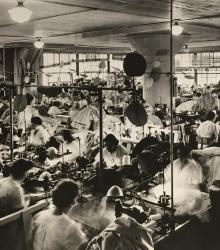Photograph of Wave Tobin and a group of protestors at a demonstration on March 17, 1937 by the International Ladies Garment Workers Union. This image was captured outside of the Gordon Brothers Garment Company, Gernes Garment Company, and Missouri Garment Company building at 2617 Grand Avenue (now Grand Boulevard), Kansas City, Missouri.
Reed, Nell Donnelly
A leaflet for the public, written by the Kansas City Joint Board of the International Ladies' Garment Workers' Union (ILGWU).
Photograph of James A. Reed and Nell Donnelly Reed's living room in their home at 5236 Cherry Street, Kansas City, Missouri. The caption reads, "#2 Living room showing entrance to sunroom left and breakfast room right. By Rich S. Welch, Operator."
Findings of fact and conclusion of law in Equity Case No. 2924: Donnelly Garment Company and Donnelly Garment Sales Company, Plaintiffs, vs. International Ladies' Garment Workers Union (ILGWU) and all members of said union as defendants in this class action. This document, created by Circuit Judge Arba S.
A Donnelly Garment Company designer showing a sewing machine operator how to work with her original design.
Photograph of policemen restraining a protestor at a demonstration on March 17, 1937 by the International Ladies Garment Workers Union. This image was captured outside of the Gordon Brothers Garment Company, Gernes Garment Company, and Missouri Garment Company building at 2617 Grand Avenue (now Grand Boulevard), Kansas City, Missouri.
A letter from International Ladies' Garment Workers' Union (ILGWU) Kansas City Joint Board Manager Wave Tobin to Fred L. Smith of C. J. Gayfer and Co., Mobile, Alabama. Tobin urges Smith to inform the Donnelly Garment Company that C. J. Gayfer and Co. will no longer carry Donnelly garments if they do not cooperate with the ILGWU.
Photograph of James A. Reed and Nell Donnelly Reed's home at 5236 Cherry Street, Kansas City, Missouri. The caption reads, "#1 Southside of Senator Reed's home. Camera pointing north. By Rich S. Welch, Operator."
Nell Donnelly and her chauffeur, George Blair, were kidnapped on December 16, 1931. Donnelly had become famous after her 1916 founding of the Donnelly Garment Company, which sold stylish but affordable dresses for daily wear by ordinary women. Backed by the sales of “Nelly Don’s,” as the dresses became known, the company grew into a multi-million dollar business with over 1,000 employees in the 1920s.
Johnny Lazia (born Lazzio) gained prominence in Kansas City’s politics during the 1920s and ‘30s due to his leadership of the North Side Democratic Club, engagement in local organized crime, and involvement with Tom Pendergast’s political machine. Pendergast dominated Kansas City politics not by holding elected offices, but through his machine of alliances and affiliates.
The history of the Donnelly Garment Company and its battle with the International Ladies Garment Workers Union (ILGWU) is one that defies conventional understandings of American life in the Great Depression. It is a story of a female entrepreneur succeeding in an era of economic paralysis, and one of a union failing to organize a factory in a period when workers won substantive rights. ILGWU president David Dubinsky, Nell Donnelly Reed, and Senator James A. Reed were the principal figures in a contest to organize a single garment factory, a legal battle that came to represent much larger questions.
